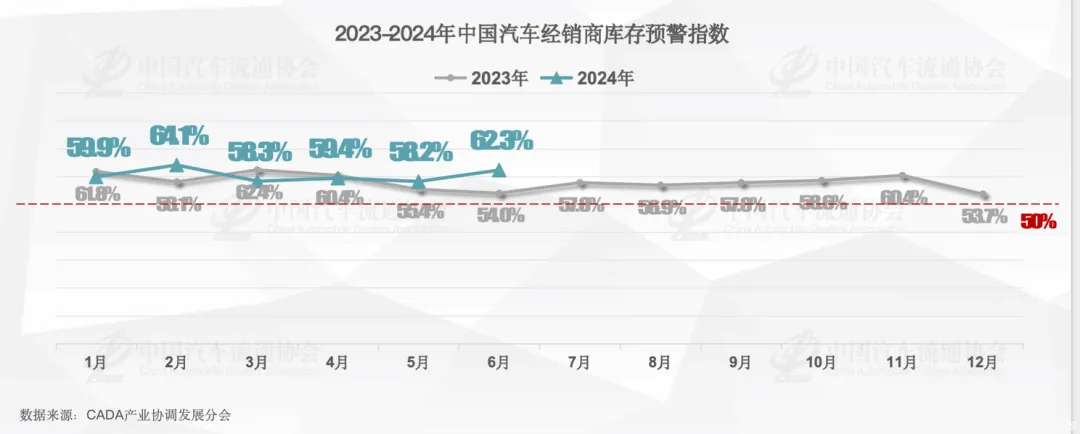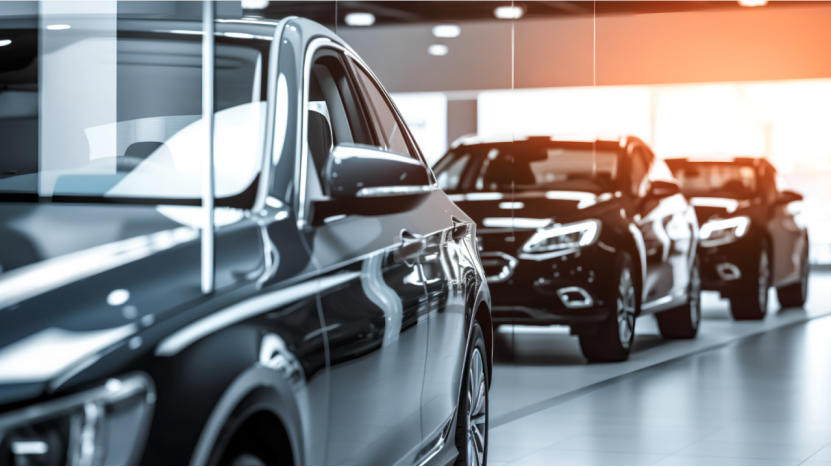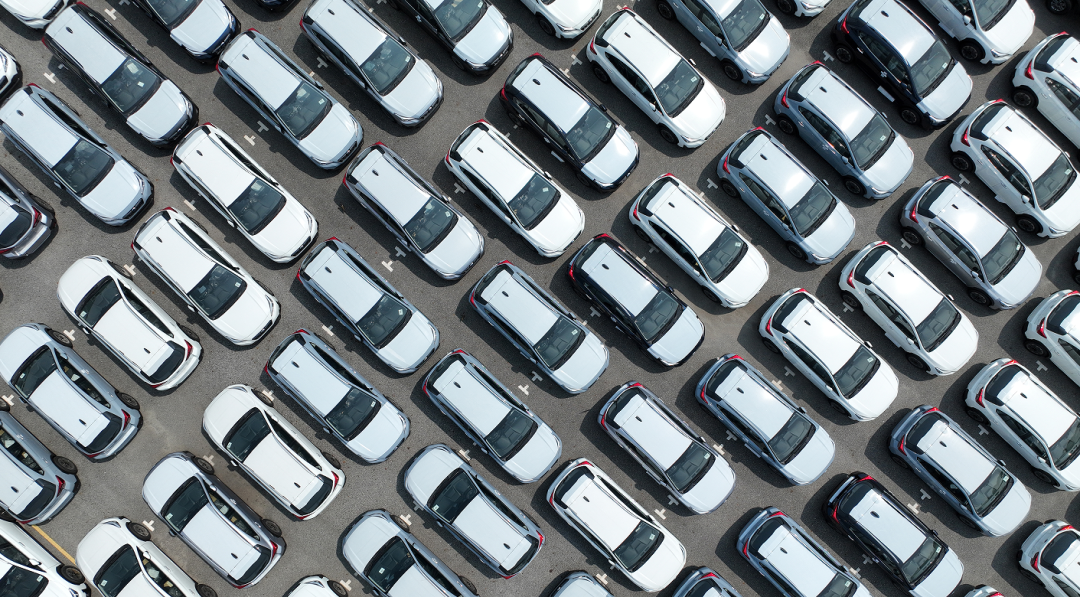Price wars force auto dealers to fall below the "profit and loss line"
![]() 07/11 2024
07/11 2024
![]() 561
561
The latest data from the China Passenger Car Association shows that retail sales reached 1.894 million units in June, down 2.6% year-on-year but up 8.7% month-on-month. Cumulative retail sales for the first six months stood at 9.828 million units, up 3% year-on-year. From June 1 to 30, wholesale sales of passenger vehicles nationwide reached 2.13 million units, down 5% year-on-year but up 4% month-on-month, with cumulative wholesale sales of 11.714 million units since the beginning of the year, up 6% year-on-year.
From a broader market perspective, China's auto market is thriving. However, from the dealers' perspective, they are facing multiple challenges such as price inversions, declining brand sales, and deteriorating relationships with manufacturers.

The latest "China Auto Dealer Inventory Early Warning Index Survey" released by the China Automobile Dealers Association shows that the inventory early warning index for Chinese auto dealers in June 2024 was 62.3%, up 8.3 percentage points year-on-year and 4.1 percentage points month-on-month. The heavy inventory pressure on dealers may become the "last straw that breaks the camel's back."
▍Dealers Facing Excessive Pressure
The difficulties faced by auto dealers are not isolated incidents. Public data shows that the operating data of most leading dealer groups in China declined in 2023, with new car sales gross margins for luxury brands also declining significantly. Amid the ongoing price wars in the auto market, auto dealers must bear the high leverage risks brought by high inventory levels while also selling cars at "price inversions," leading to an unoptimistic operating situation.
During the 2024 China Automobile Dealers Association Annual Convention, several dealer group executives pointed out in their speeches that the market share of joint venture brands and imported cars continues to decline, leading to falling transaction prices, declining profits, and increasing inventory for dealers. Even large dealer groups with multiple brands are facing the dilemma of increased revenue without increased profits.
Financial reports from several leading dealer groups last year show that while company revenues generally increased slightly, net profits showed a significant downward trend: Zhongsheng Group's net profit fell by over 20% year-on-year, Yongda Group's net profit fell by over 60%, and Meidong Automobile's net profit plummeted by over 70%.

As the country's top-selling dealer, Guanghui Auto's poor management has also become a recent hot topic. According to its financial report, both revenue and profit declined in the first quarter of this year, with net profit plummeting by 86.61% year-on-year. Amid its dismal performance, Guanghui Auto's share price has also been in a downturn, closing below 1 yuan for 18 consecutive trading days as of July 10, facing the risk of delisting.
Before Guanghui Auto, many dealers have already faced delisting and bankruptcy crises. Last year, Zhejiang Zhongtong Group was rumored to be bankrupt; in July, Pangda Group was delisted; and earlier this year, Guangdong Yongao Investment Group faced severe operational crises, with several of its 4S stores suspending operations and new car deliveries.
With dealers delisting and going bankrupt one after another, the auto circulation industry and many dealers have entered a period of profound adjustment.
▍Balancing the "Contradiction" between Manufacturers and Dealers
As the automotive industry transitions from fuel vehicles to new energy vehicles, the traditional 4S development model, which has dominated the market for over two decades, is facing unprecedented challenges. With Tesla's entry into China, new players have followed suit with direct sales models, impacting the traditional dealer model. New energy brands generally adopt direct sales models, selling and serving customers directly through a combination of online and offline channels, eliminating intermediate links and dealer involvement.
Coupled with the price wars waged by major manufacturers in recent years, new car prices have continued to decline, further compressing dealers' profit margins.
Xing Haitao, Secretary-General of the China Automobile Dealers Chamber of Commerce, told Auto Market Insight that chambers of commerce across the country have continuously received complaints from auto dealers about conflicts with auto manufacturers due to network withdrawal and store closures in recent years. "As the market share of fuel vehicles declines rapidly in the overall automotive industry, a large number of dealers will withdraw from the network, and this contradiction will become increasingly prominent."

Overcapacity and relatively insufficient demand have become the main contradiction in the current auto market. According to a survey by the China Automobile Dealers Association, dealer satisfaction with manufacturers declined significantly in 2023, mainly due to dissatisfaction with excessive manufacturer assessments, price confusion, unprofitable new car sales, and insufficient product competitiveness.
The collective protest by dealers against Porsche China for its inventory pressure is a concentrated manifestation of this contradiction. Under the joint protest of dealers, the manufacturer has also realized the severity of the issue. Luxury brands such as BMW and Mercedes-Benz have also introduced a series of measures to alleviate dealer pressure. For example, BMW has introduced exemption policies to help dealers ease cash flow pressures, while Mercedes-Benz has optimized inventory management to reduce inventory pressure on dealers.
Another noteworthy phenomenon is that the direct sales model adopted by most new energy brands has not had a positive impact on financial indicators such as gross margins. In the process of accelerating change, they have begun to adopt a dual-channel strategy combining direct sales and dealerships. Since 2024, an increasing number of new energy brands such as AVATR, NIO, XPENG, Lixiang, TANGSHI, FANGCHENGBAO, Xiaomi Automobile, and ZEEKR have chosen to reintroduce the dealership model.
The active embrace of dealerships by new energy brands is good news, but it is also a fact that dealers' profits from selling new cars are becoming thinner and new energy car maintenance costs are lower. Moreover, when there are price conflicts between direct sales and dealership channels, OEMs tend to strictly control dealers.
According to the "2023-2024 China Automobile Dealers Association Development Report" released by the China Automobile Dealers Association, as of the end of 2023, only the number of new energy vehicle channels in 4S stores nationwide increased by 17.2%, with a notable shift from fuel vehicles to new energy brands. Under this trend, some dealers have chosen to join, with Yongda Auto securing authorizations for seven independent new energy brand outlets from XPENG and Xiaomi in 2023. Other dealers have chosen to wait and see.
In this regard, Lang Xuehong, Deputy Secretary-General of the China Automobile Dealers Association, believes that a considerable number of dealers are actively adjusting their brand portfolios, closing loss-making stores, and turning to new energy layouts. However, dealers also face significant decision-making difficulties. The competition among new energy brands is intense, and not many can achieve profitability in a relatively short period. Therefore, dealers are cautious when laying out new energy brands, closing some brands without adding too much new cost investment before deploying new ones.
Regardless of the choice, dealers find it difficult to return to the peak of the fuel vehicle era. From dealers to direct sales and back to dealers, the evolution and iteration of specialized division of labor have put forward higher requirements for automakers or collaborative dealers to strengthen sales capabilities, acquire and convert sales leads.
Edited by Yang Guo | Typeset by Yang Shuo






